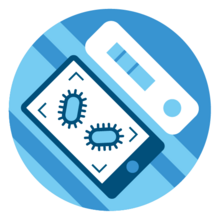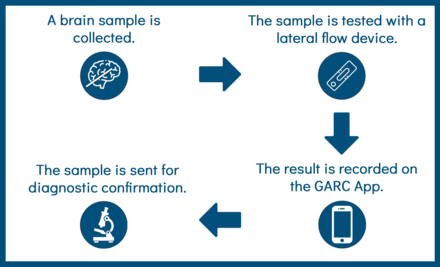

Used for: in-field diagnostic screening with lateral flow devices
What is the RAIDER toolkit?
The Rapid In-field Diagnosis and Epidemiology of Rabies (RAIDER) toolkit is a Standard Operating Procedure that provides new and existing users of rabies lateral flow devices (rapid test kits) with clear guidelines that enables them to be used effectively as a diagnostic screening* tool.
The RAIDER toolkit consists of a series of established ‘best practice’ protocols that guide end-users in the steps required to undertake effective diagnostic screening using lateral flow devices as outlined below:
- The in-field collection of animal brain samples using a rapid, safe, and non-invasive sampling technique (‘Straw method’).
- The application of in-field diagnostic screening using a lateral flow device at the community level.
- Using the Rabies Case Surveillance (RCS) tool on the GARC App to immediately capture and report the diagnostic screening result.
- The shipment of the sample to the nearest diagnostic laboratory for confirmatory testing.
The RAIDER toolkit is NOT a lateral flow device and lateral flow devices are not provided with the toolkit. Instead, the RAIDER toolkit is a Standard Operating Procedure that can be used by professionals to achieve the most effective use of lateral flow devices for rabies surveillance.
*Diagnostic screening: Diagnostic screening allows users to rapidly detect the presence of a disease for targeted outbreak response and to guide time-sensitive interventions (e.g., responsive dog vaccinations). Diagnostic screening will always require diagnostic confirmation (using a WOAH recommended test) and should never be used for decision-making for human-centric interventions (e.g., discontinuation of PEP).
What is the purpose of the RAIDER toolkit?
By implementing the RAIDER toolkit, governments can supplement their passive rabies surveillance systems with more robust and far-reaching active rabies surveillance programs that rely on point-of-care diagnostic screening. By strengthening rabies surveillance networks in such a manner, the gap between predicted and reported data can be narrowed – giving a more accurate representation of the threat that dog-mediated rabies poses to a country’s public health system.
What are the benefits of the RAIDER toolkit?
The routine implementation of the RAIDER toolkit by qualified animal health professionals can be used to:
- facilitate rabies surveillance activities in remote areas,
- strengthens programs that already rely on in-field diagnostic screening,
- identify rabies hotspots, outbreaks, and high-risk areas, and
- plan strategic and effective targeted vaccination campaigns.
You can read more about the benefits that the RAIDER toolkit provided to Zanzibar in one of our scientific publications.
Overview of the steps in the RAIDER toolkit.

What are the outputs from the RAIDER toolkit?
The RAIDER toolkit combines the benefits of the Rabies Case Surveillance (RCS) tool with immediate diagnostic screening results. Thus, the RAIDER toolkit provides capacity for more rapid response to rabies cases in the community. In addition to the benefits of the RCS tool, the use of the RAIDER toolkit provides the following outputs:
- Immediate in-field diagnosis and automated reporting.
- Improved outbreak response time.
- Sample prioritization for laboratory confirmation.
Can anyone use the RAIDER toolkit?
No, the RAIDER Toolkit has been developed for use by qualified animal health professionals who are adequately vaccinated against rabies (e.g., has received rabies pre-exposure prophylaxis) and have the legal authority to undertake government-mandated surveillance in their country.